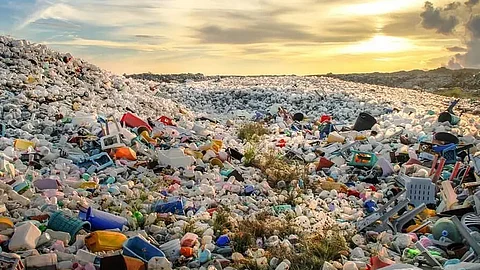
- Home
- Live Blog
- Breaking News
- Top Headlines
- Cities
- NE News
- Sentinel Media
- Sports
- Education
- Jobs

India generates an alarming 3.4 million metric tonnes of plastic waste annually, yet only half of this amount is recycled. The remaining 1.7 million metric tonnes of plastic waste remain uncollected, polluting water bodies, municipal dumpsites, roads, and drains. While the enforcement of the ban on single-use plastic (SUP) remains weak, an innovative and sustainable solution—using plastic waste in road construction—offers hope for reducing plastic pollution.
Two recent directives by the Ministry of Road Transport and Highways (MoRTH) and the Ministry of Jal Shakti aim to boost the use of plastic waste in road construction, provided they are effectively implemented at the state level. For Assam and other northeastern states, where plastic pollution is a growing threat to the fragile ecology, adopting this green technology could serve as an effective waste management solution.
The MoRTH has taken a major step by making the use of plastic waste mandatory in the wearing coat of service and slip roads along National Highways within a 50 km radius of urban areas with a population exceeding 5 lakh. In addition, plastic waste will also be used in the bituminous mix for the periodic renewal of main carriageways of highways.
Simultaneously, the Ministry of Jal Shakti has directed all states to ensure that plastic waste collected under the Swachh Bharat Mission (SBMG) is channeled into road construction projects. The coordination between road construction agencies and SBMG authorities will help establish a steady supply of plastic waste for infrastructure projects.
Since India mandated the use of waste plastic in bituminous mixes in 2015, the country has constructed over 1 lakh kilometers of roads, including 703 km of highways, using this technology. While this is a significant achievement, the reality remains that 80% of plastic packaging material is discarded in India. To match the pace of plastic waste generation, greater efforts are needed to expand plastic road construction across all states.
Plastic roads use 6–8% plastic waste mixed with 92–94% bitumen. This reduces the reliance on bitumen, leading to cost savings. The process involves shredding plastic waste into small pieces, which are then heated and mixed with hot gravel before being added to bitumen for road construction.
One kilometer of plastic road requires approximately one tonne of plastic waste combined with nine tonnes of bitumen. This leads to a cost saving of around ₹40,000–₹50,000 per tonne of bitumen. The official guidelines from MoRTH and other ministries emphasize that plastic roads enhance durability, longevity, and pavement performance.
Various types of plastic waste can be used in road construction, including:
Low-Density Polyethylene (LDPE): Found in plastic carry bags and milk pouches.
High-Density Polyethylene (HDPE): Used in shampoo bottles, detergent containers, and grocery bags.
Polyethylene Terephthalate (PET): Commonly found in plastic drinking water bottles.
Under the New Technology Vision 2022, the Indian government has made it mandatory to use waste plastic in at least 70% of the eligible rural roads being constructed under the Pradhan Mantri Gram Sadak Yojana (PMGSY). This initiative is expected to significantly increase demand for plastic waste in the coming years.
The Swachh Bharat Mission (SBMG) supports the collection, segregation, and transportation of plastic waste at the village level to ensure proper disposal. The Ministry of Jal Shakti has also issued guidelines mandating that district and block-level Plastic Waste Management Units establish forward linkages for the recycling and disposal of plastic waste. These include supplying plastic for bitumen mix in road construction or using it as an alternative fuel in cement kilns.
While using plastic waste in road construction is an innovative way to tackle pollution, it should not dilute the enforcement of the ban on manufacturing, distributing, and selling single-use plastic. A flawed perception that increased consumption of SUP can be offset by recycling it into road construction could lead to further environmental damage.
The focus should remain on reducing plastic consumption, improving waste segregation at the source, and expanding recycling programs alongside road construction projects.
Despite progress, there is still a long way to go. As of March 31, 2022, India had constructed 25,904 km of roads under PMGSY using approximately 10,362 metric tonnes of plastic waste. However, this remains a small fraction compared to the 1.7 million metric tonnes of uncollected plastic waste generated each year.
To bridge this gap, states need to:
Prioritize plastic road construction: By integrating this technology into state-level infrastructure projects.
Strengthen waste segregation: Ensuring a steady supply of clean, high-quality plastic waste for road construction.
Enhance coordination: Between road construction agencies, municipal bodies, and rural waste collection initiatives.
Promote research and development: Investing in innovative plastic recycling technologies to improve efficiency.
India's experiment with plastic roads is a promising step toward sustainable plastic waste management. By effectively implementing government policies, strengthening plastic waste segregation, and expanding the use of this technology, India can significantly reduce its plastic waste burden while enhancing road infrastructure. However, this initiative must go hand-in-hand with strict enforcement of the ban on single-use plastics to ensure a long-term solution to the plastic pollution crisis.
If all states actively adopt this green technology, plastic road construction could be a game-changer in India's fight against plastic pollution while contributing to durable and cost-effective infrastructure development.